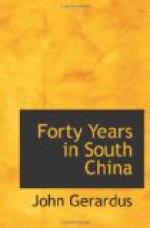“The same good feeling continues to exist at Amoy as formerly. We are on the best of terms, so far as we can judge, with all classes, the officials and people. The mandarins receive our calls and return their cards. All of them but one have visited us at our houses. Some of them call on us quite frequently. This places us on a high vantage ground. The people will not fear to listen to us, attend our meetings, and visit us at our houses, as they would if the mandarins kept aloof from us. The same good feeling towards foreigners seems to extend far into the interior. At least we go from, village to village wherever we please without hindrance, and are always treated with kindness.”
THE CHINESE BEGGAR SYSTEM.
“I have to-day been making some inquiries of my teacher concerning the system by which the beggars of Amoy are governed. The truth seems as follows: There are very many beggars in the city. In each ward there is a head-man or chief called ‘Chief of the Beggars.’ He derives his office from the ‘Hai-hong,’ or the superior local magistrate. Sometimes the office is conferred as an act of benevolence on an individual, who from sickness or other causes has met with reverses of fortune. Sometimes it is purchased. There being eighteen wards in the city of Amoy, of course there are eighteen such head-men. Their office is not honorable, but there is considerable profit connected with it. The head-men hold their office for life, or until removed for bad behavior. They get certificates of office from the ‘Hai-hong,’ and on the change of that functionary it is necessary to get the stamp of his successor attached to their certificates. Their income is derived from various sources. Monthly they call on the merchants and shopkeepers, who by paying down a sufficient amount are freed from the annoyance of beggars during the month. If a beggar enters one of these establishments he is pointed to a card which is posted up in some conspicuous place, and is a certificate from the ‘chief of the beggars’ of that ward that a sufficient amount of beggar money has been paid down for the month. The ‘chiefs of the beggars’ also receive money from a man or his family when he is about to marry, also from the family of the bride. They also receive money after the death and burial of the parents or any old member of a family; also




